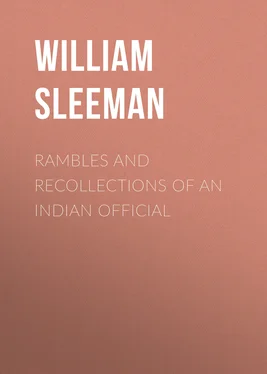William Sleeman - Rambles and Recollections of an Indian Official
Здесь есть возможность читать онлайн «William Sleeman - Rambles and Recollections of an Indian Official» — ознакомительный отрывок электронной книги совершенно бесплатно, а после прочтения отрывка купить полную версию. В некоторых случаях можно слушать аудио, скачать через торрент в формате fb2 и присутствует краткое содержание. Жанр: Путешествия и география, История, foreign_edu, foreign_antique, foreign_prose, на английском языке. Описание произведения, (предисловие) а так же отзывы посетителей доступны на портале библиотеки ЛибКат.
- Название:Rambles and Recollections of an Indian Official
- Автор:
- Жанр:
- Год:неизвестен
- ISBN:нет данных
- Рейтинг книги:4 / 5. Голосов: 1
-
Избранное:Добавить в избранное
- Отзывы:
-
Ваша оценка:
- 80
- 1
- 2
- 3
- 4
- 5
Rambles and Recollections of an Indian Official: краткое содержание, описание и аннотация
Предлагаем к чтению аннотацию, описание, краткое содержание или предисловие (зависит от того, что написал сам автор книги «Rambles and Recollections of an Indian Official»). Если вы не нашли необходимую информацию о книге — напишите в комментариях, мы постараемся отыскать её.
Rambles and Recollections of an Indian Official — читать онлайн ознакомительный отрывок
Ниже представлен текст книги, разбитый по страницам. Система сохранения места последней прочитанной страницы, позволяет с удобством читать онлайн бесплатно книгу «Rambles and Recollections of an Indian Official», без необходимости каждый раз заново искать на чём Вы остановились. Поставьте закладку, и сможете в любой момент перейти на страницу, на которой закончили чтение.
Интервал:
Закладка:
This new demand upon the city increased rapidly the price of grain, and augmented the alarm of the people, who began to urge the magistrate to listen to their prayers, and coerce the sordid corn- dealers, who had, no doubt, numerous pits yet unopened. The alarm became still greater in the cantonments, where the commanding officer attributed all the evil to the inefficiency of the commissariat and the villany of the corn-dealers; and Major Gregory was in dread of being torn to pieces by the soldiery. Only one day's supply was left in the cantonment bazaars—the troops had become clamorous almost to a state of mutiny—the people of the town began to rush in upon every supply that was offered for sale; and those who had grain to dispose of could no longer venture to expose it. The magistrate was hard pressed on all sides to have recourse to the old salutary method of searching for and forcibly opening the grain pits, and selling the contents at such price as might appear reasonable. The kotwāl 308of the town declared that the lives of his police would be no longer safe unless this great and never-failing remedy, which had now unhappily been too long deferred, were immediately adopted.
The magistrate, who had already taken every other means of declaring his resolution never to suffer any man's granary to be forcibly opened, now issued a formal proclamation, pledging himself to see that such granaries should be as much respected as any other property in the city—that every man might keep his grain and expose it for sale, wherever and whenever he pleased; and expressing a hope that, as the people knew him too well not to feel assured that his word thus solemnly pledged would never be broken, he trusted they would sell what stores they had, and apply themselves without apprehension to the collecting of more.
This proclamation he showed to Major Gregory, assuring him that no degree of distress or clamour among the people of the city or the cantonments should ever make him violate the pledge therein given to the corn-dealers; and that he was prepared to risk his situation and reputation as a public officer upon the result. After issuing this proclamation about noon, he had his police establishments augmented, and so placed and employed as to give to the people entire confidence in the assurances conveyed in it. The grain-dealers, no longer apprehensive of danger, opened their pits of grain, and sent off all their available means to bring in more. In the morning the bazaars were all supplied, and every man who had money could buy as much as he pleased. The troops got as much as they required from the city. Major Gregory was astonished and delighted. The colonel, a fine old soldier from the banks of the Indus, who had commanded a corps of horse under the former government, came to the magistrate in amazement; every shop had become full of grain as if by supernatural agency.
'Kāle ādmī kī akl kahān talak chalēgī ?' said he. 'How little could a black man's wisdom serve him in such an emergency?'
There was little wisdom in all this; but there was a firm reliance upon the truth of the general principle which should guide all public officers on such occasions. The magistrate judged that there were a great many pits of grain in the town known only to their own proprietors, who were afraid to open them, or get more grain, while there was a chance of the civil authorities yielding to the clamours of the people and the anxiety of the officers commanding the troops; and that he had only to remove these fears, by offering a solemn pledge, and manifesting the means and the will to abide by it, in order to induce the proprietors, not only to sell what they had, but to apply all their means to the collecting of more. But it is a singular fact that almost all the officers of the cantonments thought the conduct of the magistrate in refusing to have the grain pits opened under such pressing circumstances extremely reprehensible.
Had he done so, he might have given the people of the city and the cantonments the supply at hand; but the injury done to the corn- dealers by so very unwise a measure would have recoiled upon the public, since every one would have been discouraged from exerting himself to renew the supply, and from laying up stores to meet similar necessities in future. By acting as he did, he not only secured for the public the best exertions of all the existing corn- dealers of the place, but actually converted for the time a great many to that trade from other employments, or from idleness. A great many families, who had never traded before, employed their means in bringing a supply of grain, and converted their dwellings into corn shops, induced by the high profits and assurance of protection. During the time when he was most pressed the magistrate received a letter from Captain Robinson, who was in charge of the bazaars at Elichpur in the Hyderabad territory, 309where the dearth had become even more felt than at Sāgar, requesting to know what measures had been adopted to regulate the price, and secure the supply of grain for the city and cantonments at Sāgar, since no good seemed to result from those hitherto pursued at Elichpur. He told him in reply that these things had hitherto been regulated at Sāgar as he thought 'they ought to be regulated everywhere else, by being left entirely to the discretion of the corn-dealers themselves, whose self-interest will always prompt them to have a sufficient supply, as long as they may feel secure of being permitted to do what they please with what they collect. The commanding officer, in his anxiety to secure food for the people, had hitherto been continually interfering to coerce sales and regulate prices, and continually aggravating the evils of the dearth by so doing'. On the receipt of the Sāgar magistrate's letter a different course was adopted; the same assurances were given to the corn-dealers, the same ability and inclination to enforce them manifested, and the same result followed. The people and the troops were steadily supplied; and all were astonished that so very simple a remedy had not before been thought of.
The ignorance of the first principles of political economy among European gentlemen of otherwise first-rate education and abilities in India is quite lamentable, for there are really few public officers, even in the army, who are not occasionally liable to be placed in the situations where they may, by false measures, arising out of such ignorance, aggravate the evils of dearth among great bodies of their fellow men. A soldier may, however, find some excuse for such ignorance, because a knowledge of these principles is not generally considered to form any indispensable part of a soldier's education; but no excuse can be admitted for a civil functionary who is so ignorant, since a thorough acquaintance with the principles of political economy must be, and, indeed, always is considered as an essential branch of that knowledge which is to fit him for public employment in India. 310
In India unfavourable seasons produce much more disastrous consequences than in Europe. In England not more than one-fourth of the population derive their incomes from the cultivation of the lands around them. Three-fourths of the people have incomes independent of the annual returns from those lands; and with these incomes they can purchase agricultural produce from other lands when the crops upon them fail. The farmers, who form so large a portion of the fourth class, have stock equal in value to four times the amount of the annual rent of their lands . They have also a great variety of crops; and it is very rare that more than one or two of them fail, or are considerably affected, the same season. If they fail in one district or province, the deficiency is very easily supplied to a people who have equivalents to give for the produce of another. The sea, navigable rivers, fine roads, all are open and ready at all times for the transport of the superabundance of one quarter to supply the deficiencies of another. In India, the reverse of all this is unhappily to be found; more than three-fourths of the whole population are engaged in the cultivation of the land, and depend upon its annual returns for subsistence. 311The farmers and cultivators have none of their stock equal in value to more than half the amount of the annual rent of their lands . 312They have a great variety of crops; but all are exposed to the same accidents, and commonly fail at the same time. The autumn crops are sown in June and July, and ripen in October and November; and, if seasonable showers do not fall during July, August, and September, all fail. The spring crops are sown in October and November, and ripen in March; and, if seasonable showers do not happen to fall during December or January, all, save what are artificially irrigated, fail. 313If they fail in one district or province, the people have few equivalents to offer for a supply of land produce from any other. Their roads are scarcely anywhere passable for wheeled carriages at any season , and nowhere at all seasons —they have nowhere a navigable canal, and only in one line a navigable river.
Читать дальшеИнтервал:
Закладка:
Похожие книги на «Rambles and Recollections of an Indian Official»
Представляем Вашему вниманию похожие книги на «Rambles and Recollections of an Indian Official» списком для выбора. Мы отобрали схожую по названию и смыслу литературу в надежде предоставить читателям больше вариантов отыскать новые, интересные, ещё непрочитанные произведения.
Обсуждение, отзывы о книге «Rambles and Recollections of an Indian Official» и просто собственные мнения читателей. Оставьте ваши комментарии, напишите, что Вы думаете о произведении, его смысле или главных героях. Укажите что конкретно понравилось, а что нет, и почему Вы так считаете.












